We have Zero Tolerance for Greenwashing

Let’s get one thing straight.
You👏 are👏 not👏 to👏 blame👏 for👏 climate👏 change.
Climate change is a systemic problem that is disproportionately caused by a few and has the biggest impact on the most vulnerable. Concepts like the "carbon footprint" were designed by fossil fuel companies as a way to shift the blame and responsibility to change. The Carbon Disclosure Project reported in 2017 that just 100 companies cause 71% of industrial emissions, and according to the World Inequality Report, the richest 1% emmit about 70 times as much carbon as the bottom 50%.
If you want to do one thing about climate change: Vote.
Vote in local, regional, and country elections for politicians that prioritize fighting climate change. If you have a say in your company, school, or local community, use that too.
Climate experts have long said that elections and advocacy matter most. For example, a study by researchers at Concordia University found that the emissions reductions linked to voting in the Canadian 2019 elections were higher than most individual lifestyle decisions.

Why is voting so impactful? When we boil it down, we can tackle 85% of global emissions by setting increasingly stringent standards across the six biggest emitting sectors in the ten biggest economies. We could get most of the work done with just eleven policies:
- Carbon pricing
- Industry efficiency standards
- Land use policies
- Industrial process emissions regulations
- Complementary power sector policies
- Renewable portfolio standards
- Building codes and appliance standards
- Fuel economy standards
- Better urban transport
- Vehicle electrification
- Feebates (carbon taxes passed back through to consumers)
In essence, we need regulatory laws that will incentive individuals and companies towards better use of the environment. And only by voting can we get politicians to enact these laws.
We don’t believe in carbon neutrality.
Companies often claim to be "carbon neutral" while causing toxic emissions and offsetting them with cheap, ineffective carbon credits. By paying a small fee, companies – including fossil fuel companies – are claiming to be “green” and “net zero” without changing their harmful environmental practices.
Given the severity of the climate crisis, “climate neutrality” and “sustainability” have become inappropriate goals. They won’t save us. When companies promise us to be “neutral” by 2040, we shouldn’t be satisfied. We should be alarmed.
This reflection is what has led us to become a regenerative company rather than a climate-neutral one. Tero isn’t carbon neutral, but carbon negative. We remove much more CO2e than we emit, thanks to the way we invest our money.
What's Regeneration?
Tero is part of a group of organizations leading the change for a new paradigm. Regenerative businesses like ours focus on restoring and enhancing the natural and social systems on which we depend. Regeneration goes beyond traditional sustainability efforts, which aim to maintain the status quo and prevent further degradation of the environment. Instead, we strive to actively improve and regenerate natural and social systems, creating positive benefits for both people and the planet. And we embed this into every action and economic transaction we make.
We focus on building resilience, supporting biodiversity, and promoting circular systems in which waste is minimized, and resources are used efficiently. We also prioritize long-term sustainability and intergenerational equity, taking into account the needs of future generations. Overall, we rely on principles of collaboration, transparency, and accountability, and we work for the common good.
Neutrality is out. Let's shift the paradigm and make regeneration the new standard.